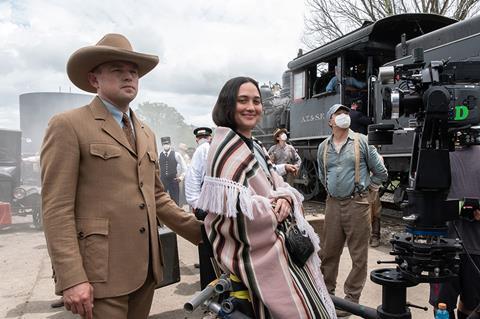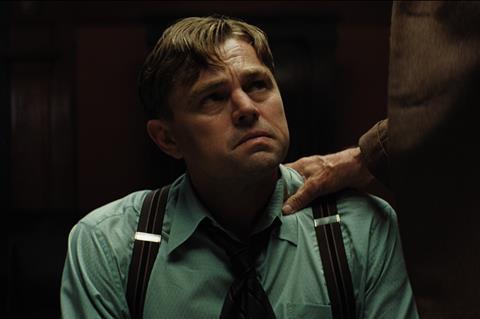
The Osage Nation murders and the subsequent FBI investigation is one of the darkest chapters in US history, involving greed, racism and the destruction of Indigenous people. In the 1920s the Osage Nation were the richest people per capita in the world, thanks to the discovery of oil on their Oklahoma reservation. Tragically, their wealth made them a target, and scores of Osage died violent or suspicious deaths, in what the newspapers called a Reign of Terror, before those responsible were eventually caught and convicted.
It’s a story that has been told across books, television, on radio and in film, but the publication of David Grann’s 2017 non-fiction tome Killers Of The Flower Moon: The Osage Murders And The Birth Of The FBI sparked a major Hollywood bidding war, with Leonardo DiCaprio’s Appian Way among those eager to buy it. All were outbid by Dan Friedkin and Bradley Thomas Imperative Entertainment, which ponied up $5m for the rights, then set the project up at Paramount with DiCaprio starring alongside Robert De Niro, and Martin Scorsese directing, producing (through his Sikelia Productions) and co-writing with Eric Roth. DiCaprio also executive produces via his Appian Way.
Scorsese and Roth’s initial draft hewed close to Grann’s book and was more of a classic western, telling the story from the point of view of Tom White, the FBI agent who rode into town to save the day. But DiCaprio, who was due to play White, had second thoughts about the direction the film was taking. “I said, ‘I don’t feel the heart of this story.’ As interesting as it is to learn about the FBI and how they solved this crime, we didn’t get into the heart of the Osage.”
In the original script there was a court scene between Mollie Burkhart, a wealthy Osage, and her husband Ernest, a dim-witted white man who tried to kill her, which gave DiCaprio a “lump in his throat”.
“That’s where I felt emotion,” he reveals. “Marty felt the same. I said, ‘How could this relationship have happened? That a man could be married to a woman of Osage descent — he had children with her — and systematically be responsible for exterminating her entire family.’ I said, ‘What is this? This is bizarre and twisted.’”
That relationship became the core of Killers Of The Flower Moon, as Scorsese and Roth met with the Osage, then shifted the focus away from White (eventually played by Jesse Plemons in the film), and onto Ernest and Mollie, who, by all accounts, were very much in love, despite Ernest poisoning her for her money. Moreover, DiCaprio now wanted to play Ernest, one of the villains.
Paramount wasn’t happy. “They said no to us twice. We said, ‘Too bad,’” recalls DiCaprio. “[Marty] went to go do The Irishman. We restructured the whole script, then Apple came in and gave us more than double the budget we originally had to do this new story.” Paramount remained onboard to co-finance and co-distribute theatrically alongside Apple Original Films, with the film grossing $156m worldwide, before landing on Apple TV+ on January 12.
To play Mollie, Scorsese cast Native American actress Lily Gladstone, who grew up on Montana’s Blackfeet reservation and earned a clutch of breakthrough and supporting actress nominations (including at the Gothams and Independent Spirits) for Kelly Reichardt’s 2016 feature Certain Women. “As much as she embodied the soul of Mollie, we looked at her as a partner in how to tell this story the right way,” says DiCaprio of his co-star. “Her influence was immense on the narrative of the movie. She brought so many different ideas. The coyote theme, this co-dependency in the relationship. We did a lot of research together. We went to the archives. Read all the testimonies. Looked at all the photographs. Spoke to as many relatives and people still affected by this story. And we worked on how to tell this love story the right way.”
Gladstone was rewarded with the Golden Globe for best actress in a drama, and must now be considered a leading contender at this year’s Oscars and Bafta Film Awards.
Guilt trip

Even as they started shooting, DiCaprio says Scorsese wasn’t sure how much he wanted to divulge of Ernest’s complicity in the murders. “We didn’t necessarily know whether it was more of a mystery that would unfold or if Marty wanted to show Ernest’s involvement right off the bat. So that’s the dance we played with.” In the end, the film makes clear Ernest’s involvement. “He’s an incredibly unredeemable character, but there was a real amount of mental manipulation that happened with his one and only father-figure,” says DiCaprio of William Hale, Ernest’s uncle, played by De Niro.
Di Caprio choose to give Ernest a clenched jaw that required the actor to wear a prosthetic piece in his mouth, along with a prosthetic nose and pronounced ears. “There was some manipulation,” he admits. “I wanted to bring him close to the few photos of Ernest [available]. De Niro also had that with his ears.” But it wasn’t just for show. “I tried to use it as a reflection, as the film progresses, of his own internal guilt and struggle. That was my idea anyway, whether it was subconscious or not.”
Killers marks the sixth time DiCaprio has worked with Scorsese, beginning with 2002’s Gangs Of New York, and the second with De Niro, following This Boy’s Life in 1993. “I was fortunate enough to have him mention me to Marty after This Boy’s Life, and that began this relationship between the two of us,” says the actor. “I’m very thankful to Bob. It’s been the great learning experience of my career working with Marty.”
While DiCaprio is linked to a number of upcoming projects, including two with Scorsese — Roosevelt and The Wager: A Tale of Shipwreck, Mutiny And Murder, the latter based on another Grann book— next for the actor will be Paul Thomas Anderson’s untitled new film for Warner Bros, co-starring Sean Penn and Regina Hall. “[I] don’t want to talk about it that much. We’re still figuring it out, but I’m going to start in a short while.”
One thing he won’t be doing anytime soon is directing. “Part of what I love the most, besides acting, is the development of my character, looking into the way we tell the story, the way we construct the narrative, working with a director in that collaborative experience,” says DiCaprio. “I wouldn’t know how to answer as many questions as a director is asked. But if there’s some story that makes me feel like I’m the sole person that could tell it correctly, who knows. For now, there are too many talented directors yet to be worked with.”























No comments yet